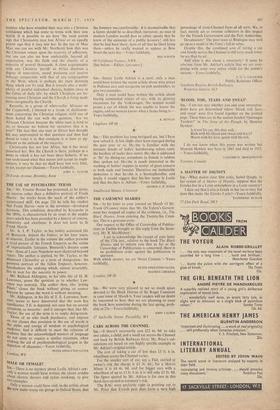THE USE OF PSYCHIATRIC TERMS SIR,—Mr. Vincent Brome has presented,
as he states, art interim rather than a definitive portrait of Frank Harris: the works bears the mark of the author's accustomed skill. On page 226 he tells his readers that Frank Harris—now in the seventies—developed paranoia. This condition, described by Kraepelin in the 1890s, is characterised by an onset in the middle years which has been preceded by a history of reserve, sensitivity and aloofness. It does not seem to fit Frank Harris.
Mr. A. J. P. Taylor, in his widely acclaimed life
of Bismarck, depicts the Junket., in his later years, as neurotic. Earlier in the volume the author presents a vivid picture of the French Emperor as the victim of impracticable fantasies. Bismarck's dreams came true: those of Louis Napoleon were shattered beyond repair. The epithet is applied, by Mr. Taylor, to the dismissed Chancellor as a term of denigration: his previous portrait of the fallen Emperor, however, foreshadows the undoing which, almost invariably, lies in wait for the neurotic in power.
Mr. Richard Aldington, in his 'able life of D. H. Lawrence, poses the question as to whether Law- rence was neurotic. The author then, like `jesting Pilate,' closes the book without giving an answer because he opines the word is without meaning.
Mr. Aldington, in his life of T. E. Lawrence, how-. ever, seems to have discovered that the term has significance. T.E. is depicted, not once but on several occasions, as neurotic: and it emerges that, like Mr, Taylor, his use of the term is to imply denigration. Those of us who teach psychiatry, and impress on our classes that precision in the use of words is the alpha , and omega of wisdom in psychological Medicine. find it difficult to meet the criticism of students that the acknowledged masters of language do not seem to require a similar exactness, when evoking the aid of psychopathological jargon in the depiction of character.—Yours faithfully,
PETER SINGLETON-GATES






































 Previous page
Previous page